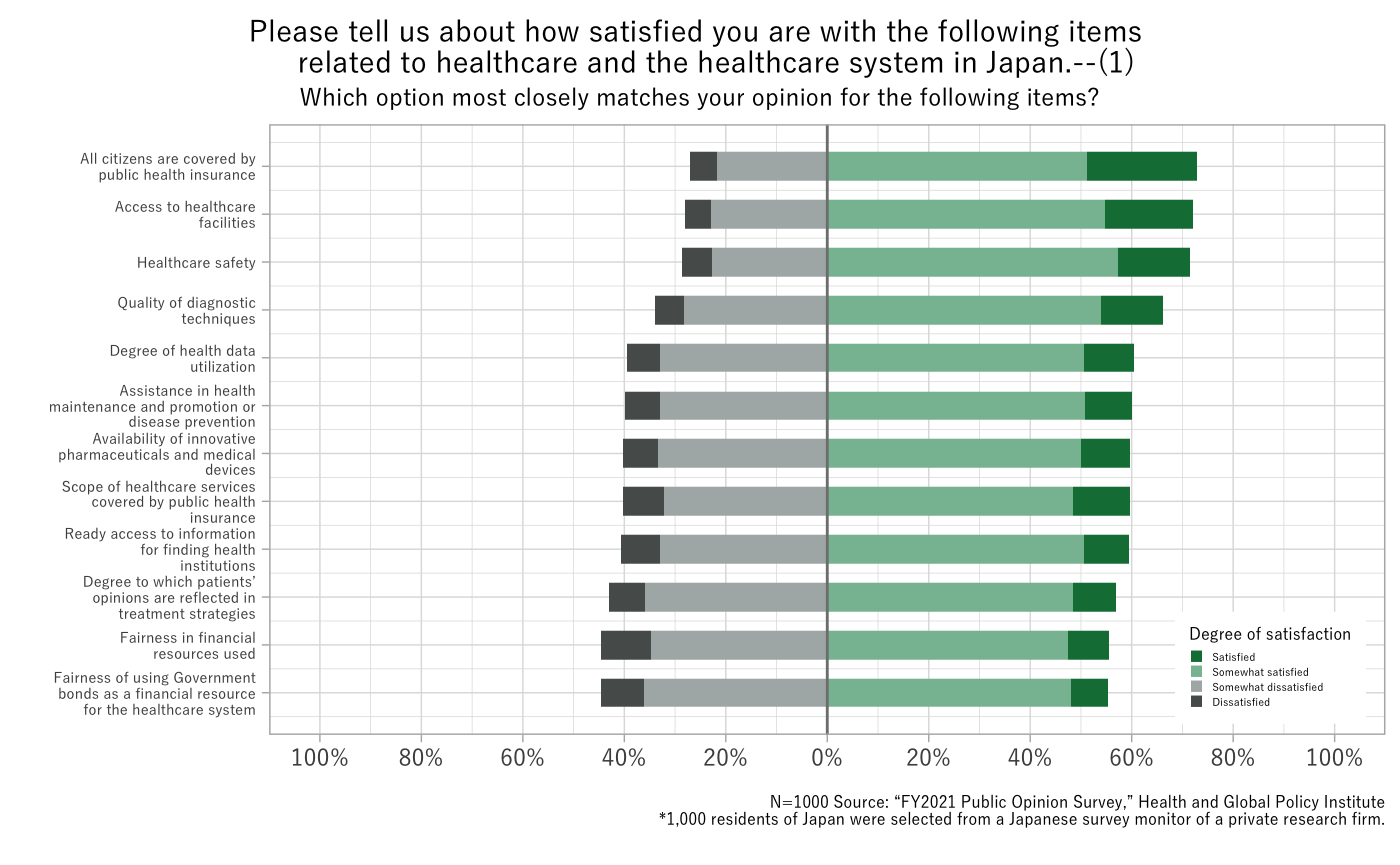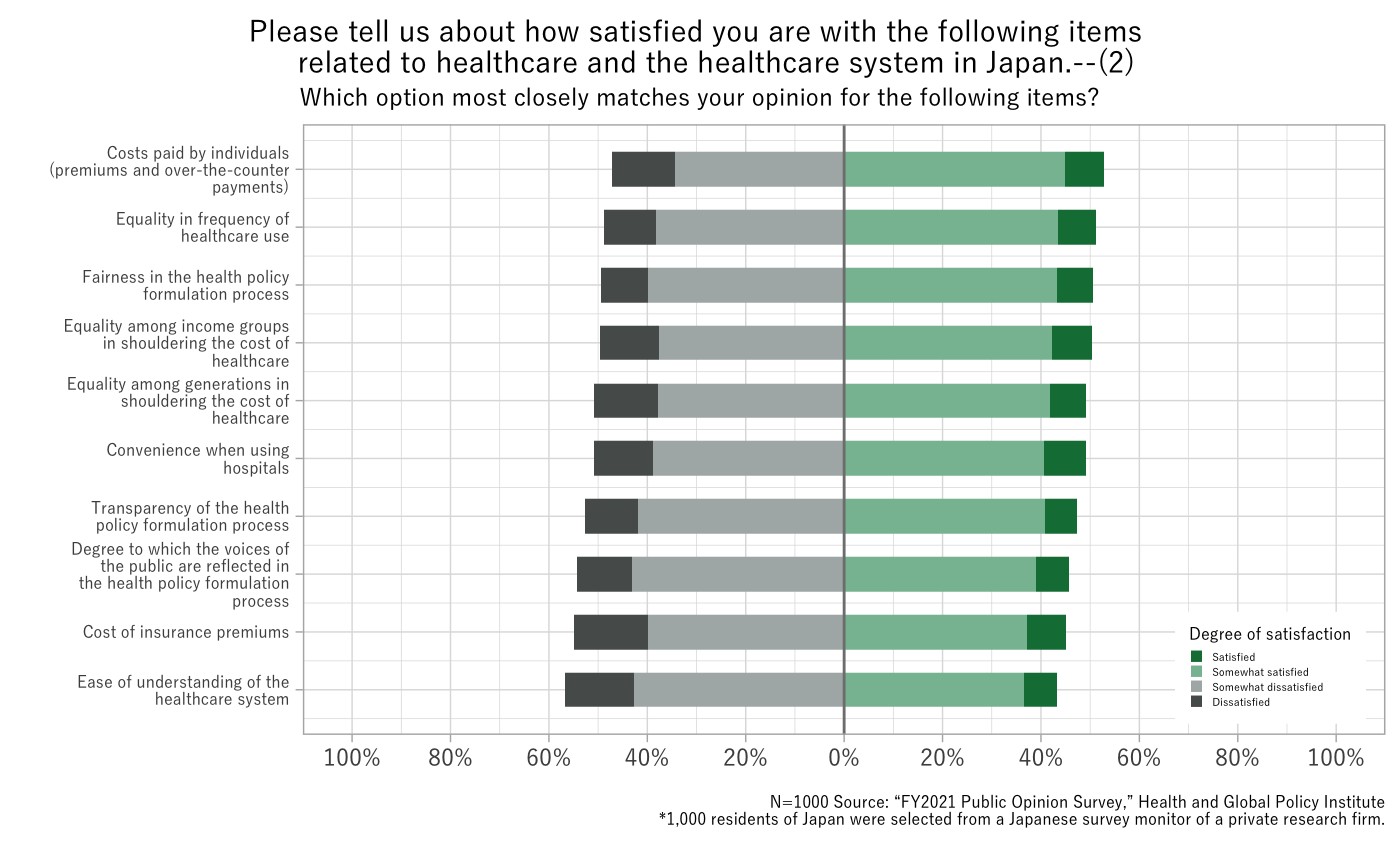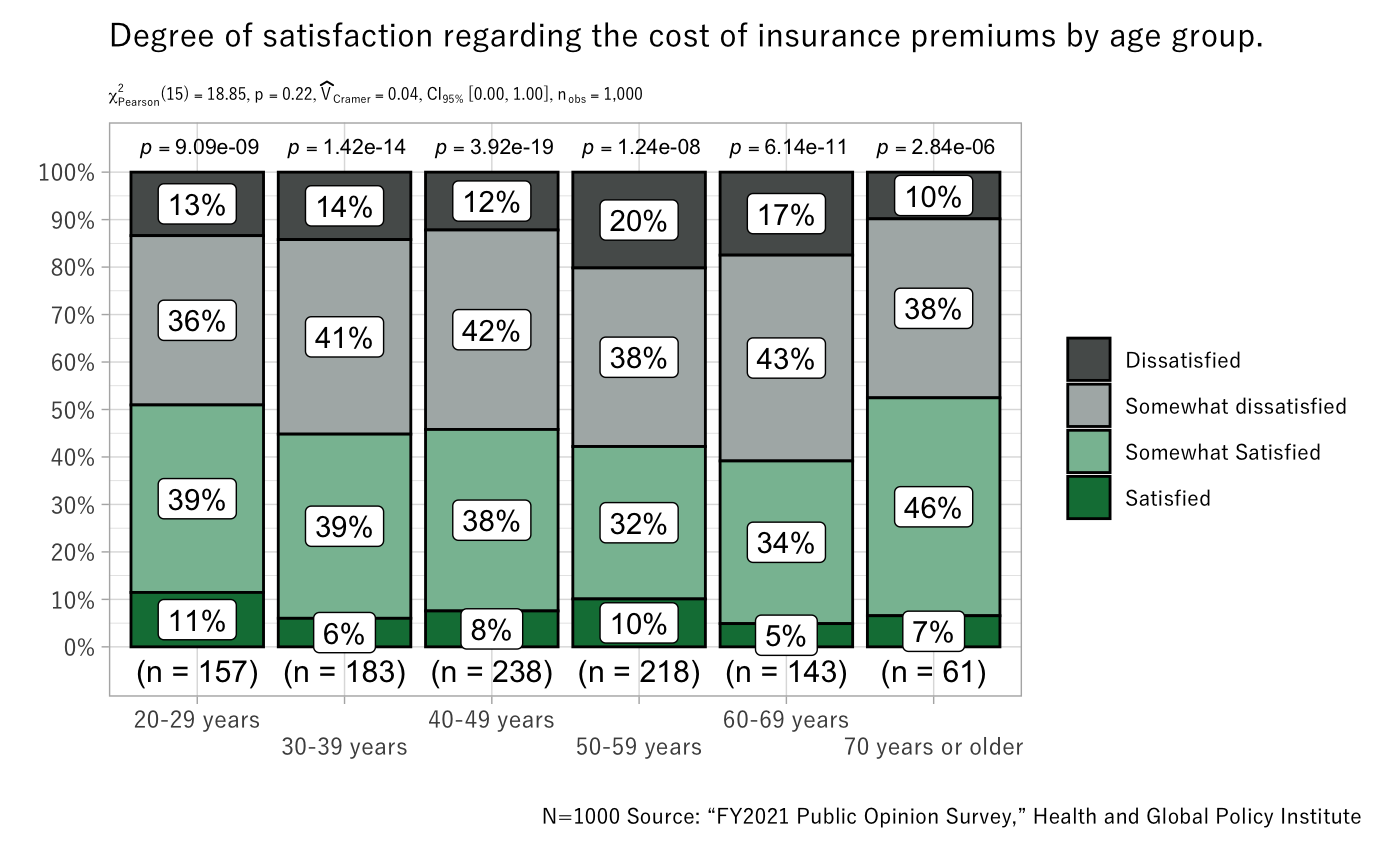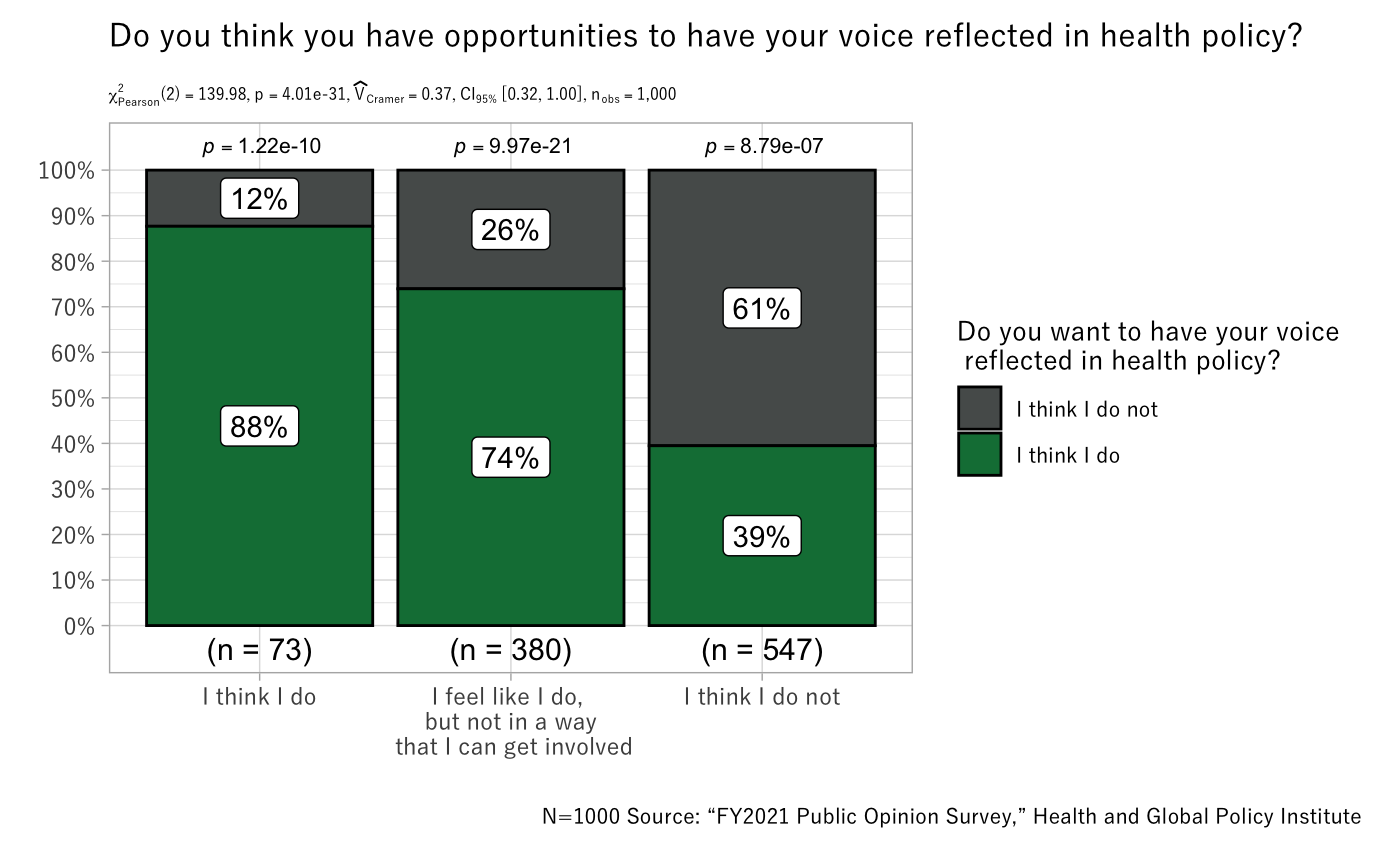[Research Report] The Public Opinion Survey on Satisfaction in Healthcare and Public Involvement in Health Policy (February 7, 2023)
date : 2/7/2023
![[Research Report] The Public Opinion Survey on Satisfaction in Healthcare and Public Involvement in Health Policy (February 7, 2023)](https://hgpi.org/en/wp-content/uploads/sites/2/hc-survey-2022-top_ENG.png)
Health and Global Policy Institute (HGPI) has presented the results of a public opinion survey on satisfaction in healthcare and public involvement in health policy.
This public opinion survey was conducted in March 2022 among 1,000 participants who were selected by age, sex, and region in ratios that correspond to the demographics of Japan’s total population.
We asked respondents to indicate their level of satisfaction toward healthcare in each of the areas described below along a four-point scale from “Satisfied” to “Dissatisfied.”(Fig 1-1 (1) / Fig 1-1 (2))
The item with which respondents were least satisfied was “Ease of understanding of the healthcare system,” followed by “Cost of insurance premiums.” Regarding “Cost of insurance premiums,” an effort to reform the social security system which aims to review benefits and burdens in the social security system and create fairness among generations is currently underway. Looking at the breakdown of satisfaction levels with “Cost of insurance premiums” by age group, we found no striking differences (Figure 1-2). On the other hand, the item that respondents expressed the highest level of satisfaction toward was “All citizens are covered by public health insurance,” which is a key characteristic of Japan’s health insurance system; followed by items related to freedom of access (“Access to healthcare facillities.”). These findings suggest that while respondents are satisfied with the services currently offered by health insurance to a degree, a lack of understanding toward the health insurance system may be preventing them from feeling convinced that the burdens associated with it are acceptable. As such, these findings suggest that enhancing understanding toward the healthcare system might contribute to higher satisfaction toward healthcare.
Fig. 1-1 (1)

Fig. 1-1 (2)

Fig 1-2

When respondents were asked if they feel they have opportunities to have their voices reflected in health policy, less than 10% said they do (Figure 2, left: n=73 / N=1000). However, about 40% of all respondents said “I feel like I do (have opportunities to have my voice reflected)(Figure 2, center: n=380 / N=1000), but not in a way that I can get involved.” When we asked that group if they want to see their voices reflected in health policy, 74% of respondents said that they do. This finding may suggest there is high demand for Patient and Public Involvement (PPI) in health policy. While taking steps to diversify methods for members of the public to get involved in the policy making process, such as by collecting public comments or holding public hearings, it may be necessary to take steps to further advance PPI by making those methods more widely known among the public.
Fig. 2

HGPI generates policy recommendations on patient and citizen involvement in pursuit of our mission of achieving citizen-centered health policy.
We also provide information on health policy on an ongoing basis in our free newsletter. Interested parties are welcome to subscribe to our newsletter here.
Top Research & Recommendations Posts
- [Policy Recommendations] The Path to a Sustainable Healthcare System: Three Key Objectives for Public Deliberation (January 22, 2026)
- [Research Report] The 2025 Public Opinion Survey on Healthcare in Japan (March 17, 2025)
- [Research Report] Perceptions, Knowledge, Actions and Perspectives of Healthcare Organizations in Japan in Relation to Climate Change and Health: A Cross-Sectional Study (November 13, 2025)
- [Research Report] The 2023 Public Opinion Survey on Satisfaction in Healthcare in Japan and Healthcare Applications of Generative AI (January 11, 2024)
- [Policy Recommendations] Reshaping Japan’s Immunization Policy for Life Course Coverage and Vaccine Equity: Challenges and Prospects for an Era of Prevention and Health Promotion (April 25, 2025)
- [Policy Recommendations] Developing a National Health and Climate Strategy for Japan (June 26, 2024)
- [Policy Recommendations] Achieving Equity in Multidisciplinary Pain Treatment and Support Systems for Pain Management (March 31, 2023)
- [Public Comment Submission] “Assessment Report on Climate Change Impacts in Japan (Draft Overview)” (December 24, 2025)
- [Research Report] The Public Opinion Survey on Child-Rearing in Modern Japan (Final Report) (March 4, 2022)
- [Research Report] Survey of Japanese Physicians Regarding Climate Change and Health (December 3, 2023)
Featured Posts
-
2026-01-09
[Registration Open] (Hybrid Format) Dementia Project FY2025 Initiative Concluding Symposium “The Future of Dementia Policy Surrounding Families and Others Who Care for People with Dementia” (March 9, 2026)
![[Registration Open] (Hybrid Format) Dementia Project FY2025 Initiative Concluding Symposium “The Future of Dementia Policy Surrounding Families and Others Who Care for People with Dementia” (March 9, 2026)](https://hgpi.org/en/wp-content/uploads/sites/2/dementia-20260309-top.png)
-
2026-02-05
[Registration Open] (Webinar) The 141st HGPI Seminar “Current Status and Future Prospects of Korea’s Obesity Policy: Voices of People with Lived Experience in Policy Promotion” (March 3, 2026)
![[Registration Open] (Webinar) The 141st HGPI Seminar “Current Status and Future Prospects of Korea’s Obesity Policy: Voices of People with Lived Experience in Policy Promotion” (March 3, 2026)](https://hgpi.org/en/wp-content/uploads/sites/2/hs141-top-1.png)
-
2026-02-06
[Research Report] AMR Policy Update #5: Cancer Care and AMR (Part 2)
![[Research Report] AMR Policy Update #5: Cancer Care and AMR (Part 2)](https://hgpi.org/en/wp-content/uploads/sites/2/HGPI_20260204_AMR-Policy-Update-5.png)




